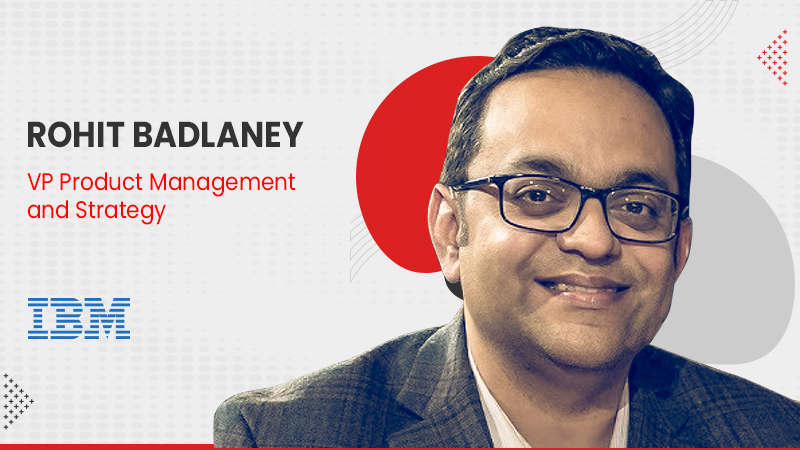We don’t aim to compete with other cloud providers – we partner.
Rohit, could you tell us a little about your journey?
I’m a long-time IBMer, having been with the company for over 20 years with roles across our Software, Systems and Cloud portfolios. In this time, I’ve leveraged my computer engineering background as a member of the Core Product Engineering team, had roles in Client Success and management roles running Profit & Loss. These different experiences have helped to prepare me for my current position as the Chief Product Officer for IBM Cloud driving the Strategy and Product Management organizations.
Originally, I’m from Mumbai, India and will forever be a die-hard fan of the Indian Cricket team. I often tell people that I bleed blue, both for the cricket team and IBM!
What challenges did the Covid-19 pandemic pose for your team?
To match the growing demand for services and the rise of remote working during the pandemic, our clients found themselves needing to pack years’ worth of digital transformation into a matter of months. In fact, according to a study by IBM, nearly 60% of C-Suite executives accelerated digital transformation during the onset of the pandemic.
I say this because as clients innovated more quickly, our team had to do the same to ensure that they could effectively take advantage of hybrid cloud. Working remotely for our team presented new challenges, but we took the need for innovation in stride and worked quickly to deliver tools that would help our clients succeed in an unprecedented landscape.
Throughout this time, we also found ourselves in a period of rapid innovation and delivered a variety of new technologies including IBM Cloud Satellite, IBM Cloud for Telecommunications and Unified Key Orchestrator, while continuing to make advancements to IBM Cloud for Financial Services.
What sets IBM Cloud apart from the competition?
IBM is a leading hybrid cloud and AI company offering clients the choice, security and. industry expertise needed to modernize and become agile. At the same time, we offer the industry’s most secure and open cloud for business.
It’s a hybrid, multicloud world and we know that our clients will host workloads across multiple environments. In fact, we encourage it. We don’t aim to compete with other cloud providers – we partner. With our hybrid cloud platform, built on Red Hat OpenShift, we don’t lock clients into one single infrastructure, giving them the flexibility and choice they need to host workloads anywhere.
Read More: IT Digest Interview with Matt Keating, Sales Director at VDX.tv
Security and trust are at the center of our strategy. What we care about is that clients’ data is protected – not where it resides. That’s why we continue to invest in security that’s second to none. With our leading encryption technology and confidential computing capabilities, we’re ensuring our client’s data is their data – even IBM cannot access it. In fact, we recently introduced a new service to make it easier for enterprises to see and control who has access to their data anywhere it resides – on-prem and even on other clouds.
With a long history of working with clients in highly regulated industries, IBM understands that trust and privacy are paramount for companies working in financial services, telco and more. Our industry-specific clouds offerings, such as IBM Cloud for Financial Services and IBM Cloud for Telecommunications were designed to help address the unique challenges of these industries. As we work to enable clients to drive innovation while protecting sensitive data, trust and privacy are at the heart of our efforts.
How do you see Cloud offerings redefining business operations, over the years?
In today’s world, using a single public cloud provider continues to decline and hybrid cloud has become the dominant IT architecture. In fact, a recent IBM study found that only 3% of respondents reported using a single private or public cloud in 2021 – down from 29% in 2019. This trend will only continue, especially as more organizations embark on their modernization journeys and turn to a hybrid cloud model to respond to increasing client demand for innovation, advance operational resiliency and reduce risk.
We’re especially going to see this adoption increase amongst companies in highly regulated industries. For example, while financial services organizations were historically reticent to move mission-critical workloads to the cloud, now they’re embracing industry cloud platforms that can help them securely manage even the most sensitive data. In fact, industry related regulatory compliance remains a significant obstacle to innovation for many – with 65% of respondents in financial markets and banking citing it is an obstacle to improving business performance in most or all parts of their cloud estate.
At IBM we’re continuing to invest in our industry-specific cloud offerings to help clients overcome these obstacles and deliver innovative products and services to their customers.
What are your thoughts on the growing innovation in cloud computing, as the rapid adoption of cloud across sectors becomes evident?
Innovation in cloud computing is critical as organizations strive to keep up with the demands of today’s digital first customers. If you want to be able to source that innovation, you have to be able to run across every major cloud provider. However, as organizations adopt a hybrid, multicloud approach, they must be wary of increased complexity and stay on top of security measures to mitigate risk.
Amidst growing cyberattacks, such as the Solarwinds hack last year, security must remain at the forefront of efforts by both cloud service providers and the companies they serve. This is where industry clouds and essential security capabilities – including Confidential Computing and Keep Your Own Key encryption technology – play a strong role to ease cloud adoption for mission critical workloads. It is also more important than ever before for enterprises to have a holistic understanding of their data security posture as they work with a vast supply chain of technology vendors. Having a single point of visibility is important for all organizations and is especially critical for highly regulated industries that handle sensitive data such as telecommunications, financial services, and healthcare.
The top 3 tech events that you have attended in the last decade, and what made them so memorable?
As a member of IBM, it is hard not to name our Think events as one of my top three. Having keynoted at several in the past, it was great to see this year’s conference return to being held in person for the first time in two years. It is amazing how much Think has grown over my time at IBM and I’m proud to see how it has evolved as we bring together a global network of change-makers and innovative leaders. This year we’ve taken Think on Tour – hosting events across the globe to share ideas and potential solutions to some of the greatest tech challenges facing us today.
Another memorable event would be the Apple Worldwide Developers Conference in 2020 where Apple announced IBM as a collaborator for Apple’s Support for CareKit. We built confidential computing into the IBM Hyper Protect Software Development Kit (SDK) for iOS which helps developers build healthcare applications that are HIPAA-ready running on Apple devices and includes features that address unauthorized party access to their data in the IBM Cloud. Health data is not only critical information, but also deeply personal and this innovation ensures it cannot be accessed by anyone except its owner.
Finally, as we continue our growing partnership with VMWare and developing our portfolio of solutions to help clients take advantage of the cloud, I always look forward to the VMWorld Conference.
Top 5 apps that you use for business?
- Box
- Trello
- Mural
- Slack
- Git Integration for Jira
What advice would you give to someone who aspires to be a leader in your industry?
Most importantly, you must be true to yourself and lead by example. I’ve learned over the course of my career that it is essential to remain humble if you want to see your teams do the same. I’ve always sought to empower my teams with meaningful and challenging work that pushes us to become the best versions of ourselves, while ensuring we are driving organizational maturity.
Finally, I believe the golden rule will always play a role in propelling your career upwards: treat others how you would like to be treated.
A technology leader whose work you follow or admire?
Arvind Krishna has made inspirational and admirable strides in his role as CEO of IBM since April of 2020. He has truly worked to propel the business forward in a time of unprecedented change. Personally, I wish I was half as smart as him!
Another technology leader who inspires me is Satya Nadella, CEO of Microsoft. I’m in a constant state of awe at the work he’s done with regards to fine-tuning Microsoft’s strategy, vision, and execution.
Thanks Rohit!


































